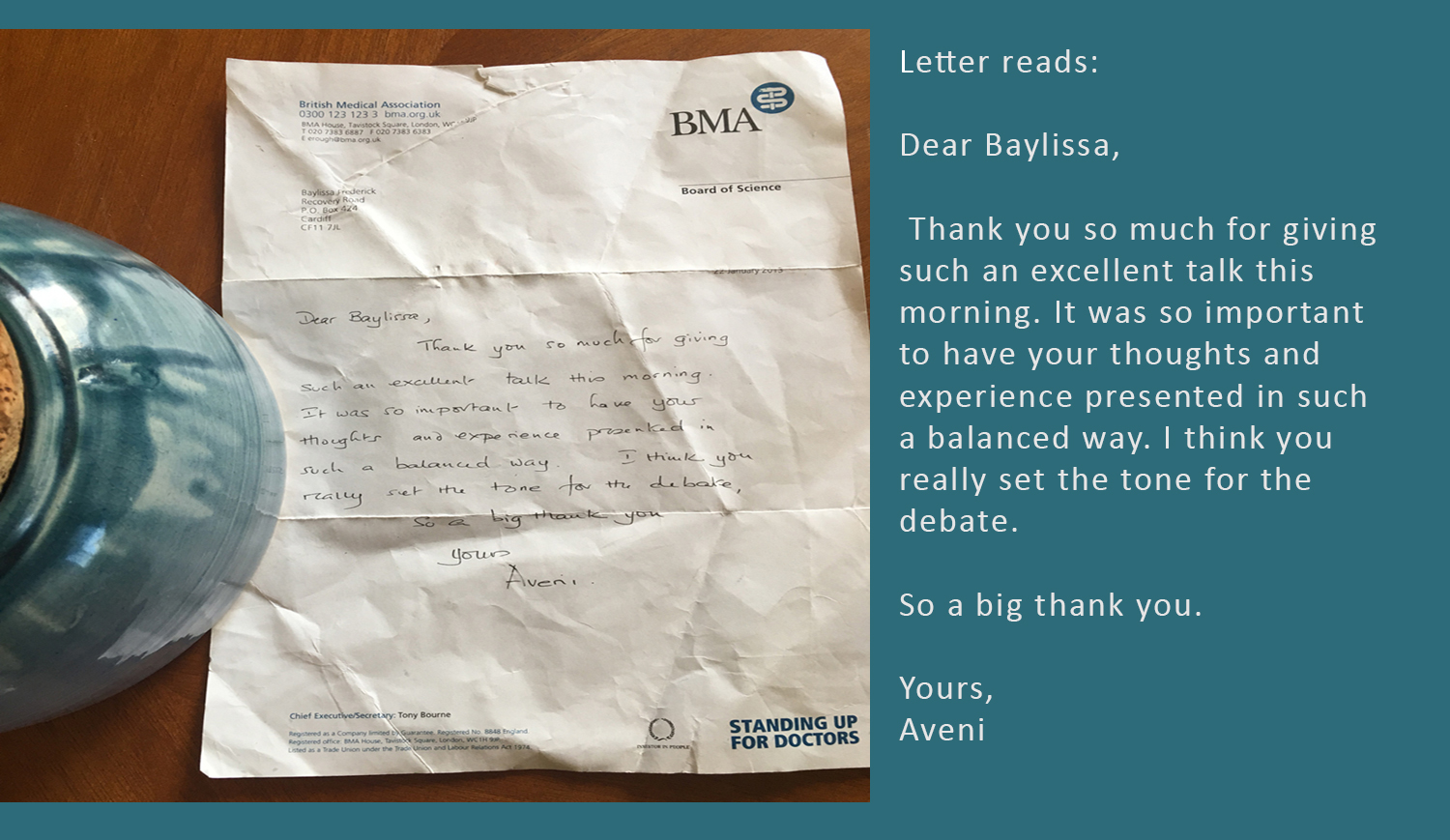This blog post was written before the passing of Professor Ashton. I am sharing it here, in her memory, as July 11th would have been her birthday.
This morning I found the above ‘thank you’ letter from the BMA (British Medical Association) dated January 22nd 2013. I was pleased to have found the letter not because of its contents, but because it reminded me of the exact date I met Professor Ashton aka our Angel of the North. I was already thinking of her, having spoken a few days ago, and so finding this letter brought reflection and a flood of good memories.
By the time we met, I had already been speaking to Professor Ashton for years and had already fallen in love with her spirit, but to meet her in person was truly a privilege. I will confess that I was not very dignified that day. We were both speakers at this BMA event and I swear I almost knocked her off her feet with a big, squishy hug (that I hope conveyed the immense gratitude and appreciation I had always felt). I was finally meeting this remarkable woman whose pioneering work had saved my life or, at the very least, saved me from further harm. Also, by then, I had already supported thousands affected and was aware of how extremely important her work is.
Have you ever had that experience where you admire someone but when you meet it’s anticlimactic (ego, ego, ego) and you are unpleasantly surprised? Well, this was the opposite. Prof. Ashton turned out to be the most compassionate, most genuine, patient, honest, supportive, well-intentioned person you could ever want to meet. I can’t properly articulate just how lovely and empowering she is. Not only that but she is witty with a great sense of humour, a brilliant writer, artist and story-teller, a great listener and more.
Reflecting on our conversations over the years, these are the lessons that come to mind:
1. Don’t generalise as no one size fits all. The withdrawal experience is too individual a process and each case has to be considered on its own merit. Consider variables and do not be specific or predict based on past observations or on subjectivity.
2. She was concerned about the effects online groups were having on the more vulnerable and desperate individuals and felt there was a lot of misinformation, inappropriate advice and increase of suicide risk. I think this is true to some extent but having experienced withdrawal and knowing how isolating it can be and how invalidated many are, I think there are benefits. However, I understood her concerns… that if not used wisely (taking breaks, being cautious re subjective advice, being aware of vicarious distress), it can be a harmful pastime.
3. Regarding my work, she knew me well enough to be confident that I would run a group that is as encouraging and uplifting as we have here at baylissa.com (Bloom in Wellness, our Facebook groups, our meditations, webinars and workshops, etc.). So she was fully supportive of my idea to offer a website that would attract people who wanted to focus on healing, where every member was traceable and there could be no bullying, and where only responsible information would be disseminated. This is exactly what we have and she is pleased with me for doing it.
4. Beware of the pseudo-scientific theories. In the earlier days, I would phone her excitedly to tell her of some link made between withdrawal and whatever… I would send her the different hypotheses, abstracts and explanations sent to me and she would point out why, although very intelligent and scientific sounding, they were completely inaccurate. She discouraged me from quoting random studies or becoming involved in debates about the causes of symptoms, over-analyses, etc. This is why although I research new information and note all the theories sent to me, you will always only hear me say, “Well, I’m not sure why, other than you being in withdrawal.” When someone tells me specifically what is causing a symptom, I say, “Oh, right… I see” and that’s it. 🙂 I am not saying they are wrong, but I also don’t know that they are right.
I always remind myself that association or correlation may imply, but not confirm, causation and also that much of what takes place remains unknown. I am not an expert and all I have is going on 14 years of anecdotal evidence/cases and a lot of insight into the outcomes of actions (hence my subjective advice caution).
5. Tapering – She often reminded me of the importance of doctors modifying a taper according to the person’s experience and that again, no one size fits all. There were people, she said, who needed to reduce every month or six weeks and no quicker, and others who were okay using the times in the protocols. The withdrawal schedules are to be used as a guide but flexibility is required as much more has to be considered when tapering (support, pre-existing issues, symptoms, etc.). The final decision re tapering should always be the patient’s.
6. Everyone heals. When I first started supporting people online, if I heard a most cruel withdrawal account, I would call her to ask whether or not someone with that person’s severity of withdrawal symptoms or unusual history could heal. She would always tell me, “Yes, Baylissa. Everyone heals.” I know that there are references to her speaking of long-term symptoms but those are isolated symptoms. In terms of the complex cluster of withdrawal symptoms, yes… everyone heals but we must give the process time. For the very protracted cases, she would say, “Baylissa, this can take time so ask the person to continue to wait.” She would then say, “I am sure s/he will recover.” She was always right about this.
7. Integrity – More than anything, Professor Ashton is a woman of utmost integrity. She has no interest in anyone’s social background or status and during her active years helped anyone she could. In fact, I would say she has an advocate’s gumption, a heroine’s heart and a warrior’s spirit. During her active years, she quietly focused on the tasks at hand. She had and still has no need for bravado and ego preening. She does not crave the limelight and her main interest was in helping the vulnerable ones suffering under the radar through a most difficult time, and in educating and promoting awareness. What I witnessed was exemplary and is why I love and respect her so much.
Those were my main lessons, for which I will always be grateful.
She also helped me when I started charging for consultations in 2014 (after 8 years of doing them for free, without an income). The outcry that, “Baylissa is taking money from sick people” made me so upset, I spoke to her about it. I had already discussed my plan to do consultations rather than continuing to try to find other work as a therapist, and she was delighted that I was going to hang around and not disappear like many did. I had no money, had lost my home, had declared myself bankrupt and was struggling to regain my financial footing. I had no alternative course of action, but it was still a difficult thing to do.
Anyway, in her sagacious manner she asked, “Will you be able to manage otherwise? Where will you live? You are a licensed therapist; why would you work for no pay? I don’t know anyone who does that.” She encouraged me to not allow my work to be devalued by people who pay therapists and other professionals, with limited knowledge of withdrawal, exorbitant fees for dubious advice. With my chin up and head held high I carried on, but always making sure to this day that I support those unable to pay, too.
I could go on and on about Professor Ashton, but these are the main thoughts that have come to mind today. Unrelated to withdrawal would be our other conversations about life and my dating life which was hilarious – e.g. the Vicar who asked me not to send him any spiritual emails as he didn’t really believe in God. Needless to say, my non-existent romance updates were always on the agenda and she always gave good advice. Sometimes we would chat until she got breathless (due to a respiratory condition) and we would hang up and then she would call me back later to finish the conversation.
Well, this is an insight into my little part in the life of our Angel of the North and her big part in mine. If the only way for me to have met her was to go through the trauma of withdrawal, I can unhesitatingly say I would do it all over again. Thank you, dear Professor Ashton. Thank you for not only saving my life, but for impacting it in so many other positive ways. I love you, dearly.

